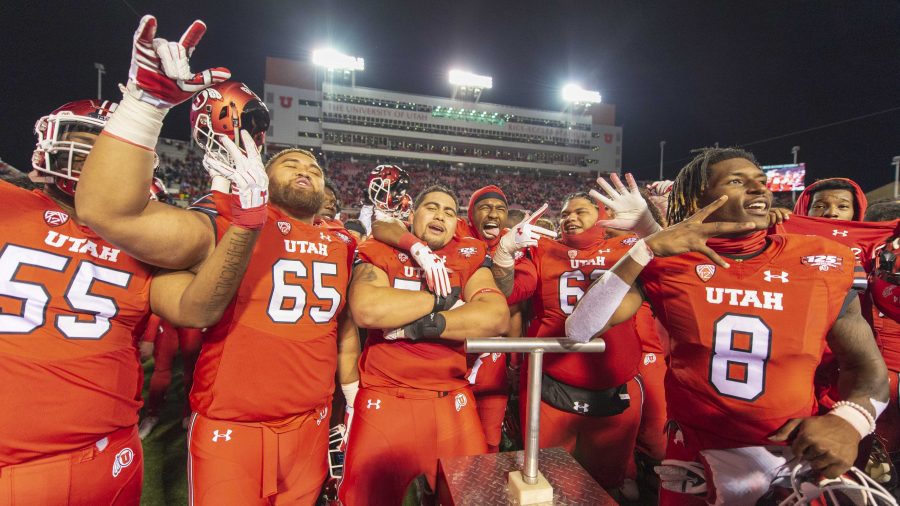“Do you believe in miracles?”
These five words were shouted over television waves by legendary sports broadcaster Al Michaels as members of the 1980 U.S. men’s hockey team swarmed over the benches, pooled over each other on the ice and celebrated a victory over the Soviet Union’s hockey team in that year’s Winter Olympics, etching themselves into sports history.
It wasn’t until the last leg of the men’s 4×100 relay in the 2008 Summer Olympics that swimmer Jason Lezak came up from behind to inch out team France in the fastest individual split ever recorded. The team claimed Olympic gold in Beijing in the face of criticism and speculation. Dan Hicks left his seat to announce that the U.S. had taken the gold.

“He’s done it!” Hicks said. “The U.S. has done it! A new world record!”
Another famous announcement: “The Giants win the pennant! The Giants win the Pennant! The Giants win the Pennant!”
Russ Hodges exclaimed this eternal phrase with joy as New York Giants third-baseman Bobby Thompson launched a series-clinching home-run into the left-field stands, sending the Giants to the 1951 World Series over the Brooklyn Dodgers. In 1951, radio broadcasts weren’t typically recorded, but Lawrence Goldberg had his mother record the game while he was at work. Hodges’ call wasn’t supposed to be remembered, but somehow, it survived. Fans would hear this act of pure jubilation for decades because of an off-chance occurrence.
Sports has a way of breaking the mold of the times. When the world seems to be coming down around us, sports find a way of bringing us together. It’s a beautiful thing and, while impossible to prove, it is characteristic of humans to come together in times of strife. Throughout history, sports have helped people to do just that. To look at some of the greatest moments in sports is to look at the most powerful moments in human history.
On May 1st, 2011, the New York Mets and Philadelphia Phillies met for another rivalry night MLB match. In front of millions of viewers on national TV for Sunday Night Baseball, the two teams squared off to renew a decades-old rivalry. Simultaneously, President Barack Obama publicly announced that Osama Bin Laden had been killed by a team of U.S. Navy Seals, and in real time, in front of a national audience, word began to spread quickly throughout the stadium. Chants of “U.S.A, U.S.A.” broke out throughout the entire stadium and suddenly the game itself didn’t matter anymore. Mets fans and Phillies fans were gathered together, celebrating a moment that made the game that they were watching. The rivalry they had manufactured was meaningless. Everyone in the world knew what had happened except for the 18 players on the diamond.
“I didn’t really understand what was going on there for a minute,” said Phillies’ starting pitcher Cliff Lee after the game.
“Certainly something bigger to celebrate than this,” said Mets’ manager Terry Collins.

(Photo by Curtis Lin | Daily Utah Chronicle)
Everyone at Citizens Bank Park had a reason to celebrate, but that doesn’t compare to Sept. 21, 2001, when the Mets held their first game since the attack that would spark unity a decade later. The 2001 game was held in grief-filled, eerie circumstances, just ten days after the attacks rattled the nation. After the game, players on opposing teams embraced, cried and celebrated that they might be leading their world towards normalcy in the wake of chaos. The act of playing sports has held different significances throughout history and in every culture which has adopted them.
Sports have meant different things to a lot of different people, and as such people have come to feel different ways about the act of playing a sport. To some, it is a growing mechanism that can teach leadership and team skills. To others, it’s a way to escape the trenches of everyday life. It has been a status symbol, with certain sports being available only to those who met the qualifications to play it. It has been a tool of empowerment for those who were oppressed by the world around them and it has also been a unifier for people across the world.
In spite of troubled and hard times, sports have managed to stay a consistent part of the world culture. It’s easy to love games because of this phenomenon. But why do we? Why are there billions of dollars invested in arbitrary scores and numbers? There are a few different reasons.
First, sports are encompassing. There can be millions of people backing a particular team that come from all walks of life and the relationships that people have with their team can involve identity, self-esteem and pride. Sports can invoke such a level of passion in fans that a victory or championship can invoke childlike emotions of joy and wonder. The reason behind this phenomenon has a lot to do with how we connect with the teams we love. There are studies that show that the brain is consistently confused about whether achievements or accolades belong to the body it inhabits or to another person that it is in a relationship with.

“There is reason to believe that watching sports engages this connection,” said Eric Simmons of the Columbia Journalism Review. “We connect to our teams, the players on our teams, and other fans of our teams. We bask in reflected glory because there is an actual point of contact, at the neural level, between a team’s performance and our own self-esteem.”
There’s also evidence to support the premise that the following of a sports team is on a level field with tribalism and group psychology which have been built into our genome throughout human history. We tend to stick with those who think like us, and nothing says that quite like wearing the same jersey and following the same team. This level of groupthink is powerful, and it can sometimes be dangerous. There are countless instances of violence between fans of rival teams— the Dodgers/Giants stabbings in the early 2000s, the Vancouver Canucks’ fan base rioting in the streets after losing a heartbreaking Game 7 in 2011 and countless other examples of connections with teams that fans can take too far. There is a fine line between the right and wrong kind of connection to one’s team.
Sports can also be a release for the athletes that play them. There are thousands of instances where, in a moment of athletic greatness, the mind takes over, and the body does exactly what the athlete commands it to do. This element, commonly referred to as “flow,” is pivotal in the highest caliber of sports, where the margin between victory and defeat are extremely small. It’s one of the many reasons behind the phenomenon where athletes will describe their most pivotal moments as surreal.
Sports has also been used as a vehicle. In many instances, athletes have used their game to make a statement about their world or how they tried to change it themselves. Nobody knew that the rivalry between two horses could be so riveting until Affirmed won the Triple Crown in 1978, beating Alydar by a head. Jesse Owens’ four gold medals at the 1936 Olympics in Germany meant a lot more to many than just a win in the races themselves. Jackie Robinson’s debut was much more than just a first look at a hot baseball prospect in 1947. Some of the most momentous occasions in human history have sports to thank.
One of the unique qualities that sports have is its ability to provide a family to fans. Whether it’s shared locker rooms, adjoining seats or cheering for the same thing, sports can give a sense of community in the most unlikely of circumstances.
One of the reasons that so many people develop such a passionate love for sports is that sports can mean whatever one wants them to mean. Because of its simplicity, sports have the potential to be a different experience for each set of eyes that view it. Sports can have such a powerful influence in the world, or they can mean nothing at all. They can be inspiring, they can provide role models for a generation just looking to fit in, they can offer a way out of difficult life circumstances, they can build character, they can spark change. They can do all of these wonderful things if the world around them allows them to do so. If not, they will push on, continuing to destroy the bounds set on them by outside entities, much like the course of human history itself. We love sports because they can do so many things and because we feel joy when the athletes we root for feel joy. We sympathize, cry with and celebrate with complete strangers. It’s a beautifully chaotic dynamic that, so long as the human spirit lives, will exist in conjunction.


